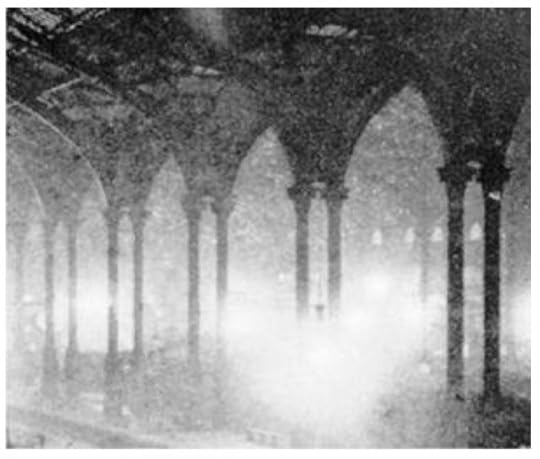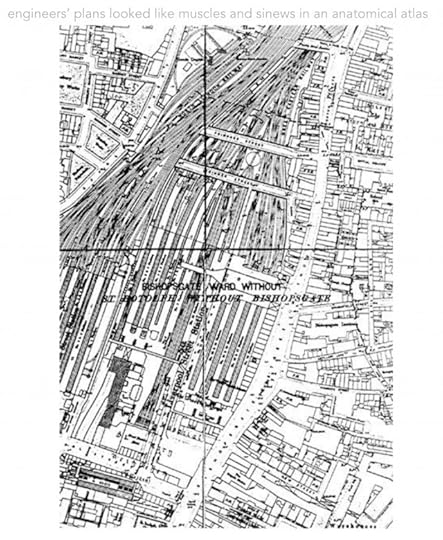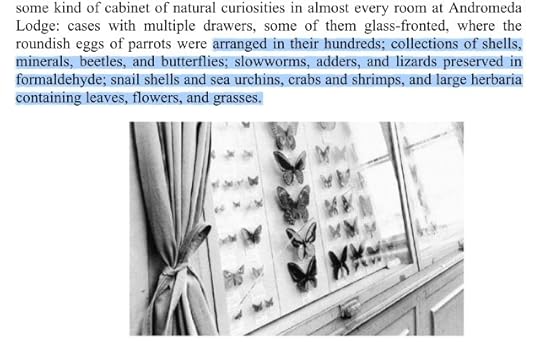21st Century Literature discussion

This topic is about
Austerlitz
2018 Book Discussions
>
Austerlitz - 2 - Spoilers up to M151/ P213 (Oct 2018)
date newest »
newest »
 newest »
newest »
 I'm loving the read so far. So unique.
I'm loving the read so far. So unique.Toward the end of this section Austerlitz's tale sort of shifts. Up to this point it's been pretty straightforward, but then there's this rabbit hole moment, where he is standing in the train station and has a sort of memory vision. It's a beautifully described scene, very Borges-like, (he even mentions a labyrinth) where things turn surreal.
The writing here was crazy good I thought. Looking forward to hearing how everyone else is doing with this.
 Kathleen wrote: "Toward the end of this section Austerlitz's tale sort of shifts. Up to this point it's been pretty straightforward, but then there's this rabbit hole moment,..."
Kathleen wrote: "Toward the end of this section Austerlitz's tale sort of shifts. Up to this point it's been pretty straightforward, but then there's this rabbit hole moment,..."Yeah, I highlighted “portal” on my ebook of this
You go in through a narrow doorway let into the main portal, and find yourself first in a dim barrel-vaulted entrance through which coaches and carriages used to drive into the inner courtyard...
There’s a strong sense that there’s more to the material world, there’s one reality, there’s another one buried; only perceivable if you approached it in a certain way. Like Austerlitz uncovering his double identity.
The “entrance to the underworld” photo works really really well with the text. The paragraph screams post-industrial modern day Inferno

“fifteen to twenty feet below street level, was one of the darkest and most sinister places in London, a kind of entrance to the underworld...the towering cast-iron columns with their palmate capitals were all covered in a greasy black layer formed, over the course of a century, by coke dust and soot, steam, sulfur, and diesel oil ... in this eternal dusk, which was full of a muffled babble of voices, a quiet scraping and trampling of feet, innumerable people passed in great tides, disembarking from the trains or boarding them, coming together, moving apart, and being held up at barriers and bottlenecks like water against a weir.”
 I see the Borge sense of labyrinthine lost-in-the-city/building feeling, but another thing is, Sebald repeatedly compares cities, buildings, designs to anatomy. Like this one here:
I see the Borge sense of labyrinthine lost-in-the-city/building feeling, but another thing is, Sebald repeatedly compares cities, buildings, designs to anatomy. Like this one here:
The muscle-likeness is obvious, I imagine Sebald probably saw that in a map and decided to work that image into his collage of a novel. The effect (for me) is that I ended up associating his city/ infrastructures with Frankenstein — as in, what kind of monstrosity have we created?
 In the first section, Austerlitz described Gwendolyn’s compulsive use of this white powder:
In the first section, Austerlitz described Gwendolyn’s compulsive use of this white powder:powder herself with a kind of cheap talc from a large container standing on the little table beside her bed. Gwendolyn used such quantities of this powder, fine as dust and slightly greasy, that the linoleum floor around her bed, and soon the whole room and the corridors of the upper story as well, were covered with a white layer
And he randomly recalled this only because he read about some white power in another book:
when I was reading the reminiscences of his childhood and youth by a Russian writer who describes a similar mania for powder in his grandmother, a lady who, although she spent most of her time lying on a sofa nourishing herself almost exclusively on wine gums and almond milk,
Apparently that was Nabokov’s Speak, Memory.
The reason I so randomly brought it up in the wrong (2nd) section is because the butterfly collection in Andromeda Lodge reminds Nabokov’s hobby! It’s wild how illogical random associations and memory retrieval in Austerlitz reminds me of a real world academic/ writer, his memoir, and his quirky, geeky hobby!
Speaking of that dead-bugs collection:

Obviously, that also recalls the Nocturama in the beginning: animals taken out of their dwelling place to be placed in some kind of collection by acquisitive humans. The Andromeda Lodge sounds like such an otherworldly, blissful time/place for Austerlitz, it’s jarring to see that it also participates in that de-worlding and cataloging and re-institutionalizing.
Speaking of Butterflies/ Moths, at an interview with Kafatou, Sebald said:
Kafatou: Alec Garrard is one exemplification of the artist at work. Another, more elusive figure for the spirit of art is the Nabokov-like butterfly collector, who in one of his appearances in your work distracts a character from committing suicide. Yet another is the butterfly itself, or the moth
Sebald: I've always been interested in invertebrates, in insects, and very muclh in moths. They are infinitely more numerous than butterflies, more various, and often more beautiful. They exemplify the so-called biodiversity which is now being lost. A thing that appeals to me particularly in the moth is its secretiveness. Butterflies flit about in daylight, moths hide in darkness. You
only see them when, for instance, they get into a house. Then they sit absolutely still in a fold of curtain or on a whitewashed wall, for days on end, until all life has gone out of them and they fall to the floor. Suppose that you had lost your way back out to the garden, to anything living and green! What the moth does in that case is simply to hold quite still until it just keels over.
Perhaps that is what we should do, instead of bustling about going to see the doctor and causing trouble to everyone around us. The idea of transformation, metamorphosis, in terms of turning from a pupa into a beautiful winged thing, doesn't particularly appeal to me. It strikes me as rather trite. To me the really wonderful thing about these insects is the way they perish.
Which is rather dark: for Sebald, perishing, leaving behind artifacts is what is wonderful, not the momentary flash of brilliance.
 Lia I somehow missed Sebald's reference to a Russian writer's memoir but I was coming here to post to say how much the first half of the book (in particular his reminiscences of early life in Wales - Andromeda Lodge especially so) reminded me so vividly of reading Nabokov's Speak, Memory. So it's really neat to read your post where you tie this all together.
Lia I somehow missed Sebald's reference to a Russian writer's memoir but I was coming here to post to say how much the first half of the book (in particular his reminiscences of early life in Wales - Andromeda Lodge especially so) reminded me so vividly of reading Nabokov's Speak, Memory. So it's really neat to read your post where you tie this all together. These early childhood scenes were utterly mesmerizing. I just reached the point where the story changes to him visiting his childhood home and I expect I'm going to fly through it this weekend, it's difficult to put down.
 Thanks Jen! Glad you can join us. I was starting to worry my wild associations were turning people off discussion!
Thanks Jen! Glad you can join us. I was starting to worry my wild associations were turning people off discussion!I think Sebald doesn’t always verbally spell out all that is happening. He’s also manipulating readers perception without saying things that cannot be said. And part of that is by making readers pick up impressions or associations with other texts, or space, or institutions, or image, or films. If you’re noticing similarities or links or associations with other texts, I hope you’ll share with us.
 I am about 20 pages past this section's stop. It's a good place to stop, as the book changed for me at just about this point. Up until this point, Austerlitz has been talking about himself, remembering his school days, his foster parents, his best friend, and his descent into depression. Then the epiphany in the train station, which I loved. Now we are at the precipice of the life he lost.
I am about 20 pages past this section's stop. It's a good place to stop, as the book changed for me at just about this point. Up until this point, Austerlitz has been talking about himself, remembering his school days, his foster parents, his best friend, and his descent into depression. Then the epiphany in the train station, which I loved. Now we are at the precipice of the life he lost.
 Lia wrote: "Thanks Jen! Glad you can join us. I was starting to worry my wild associations were turning people off discussion!
Lia wrote: "Thanks Jen! Glad you can join us. I was starting to worry my wild associations were turning people off discussion!I think Sebald doesn’t always verbally spell out all that is happening. He’s also..."
I love your associations, Lia! I'm glad you pointed out the underworld photo and paragraph. I didn't realize how much that was emphasized.
And so interesting about comparing the city to anatomy. I think of it sort of the other way around, that he is looking through the eye of an architect and seeing our lives as a kind of structure. I love what you say about his manipulation of our perception. I can't say I understand it, but it's definitely working. :-)
I've just read past this section. It's my first Sebald & I'm hooked.
I would say that the moths are an analogy of Austerlitz himself; he was displaced at an early age and is trying to find his way back to his family, he painted his house grey & lives there minimally and is prone to 'night-wandering'. He is spending his old-age 'clinging to the wall'.
I would say that the moths are an analogy of Austerlitz himself; he was displaced at an early age and is trying to find his way back to his family, he painted his house grey & lives there minimally and is prone to 'night-wandering'. He is spending his old-age 'clinging to the wall'.
 Great analogy, Catronia. I found that Austerlitz became almost suicidal in his depression. So it is a relief that he found this portal, a way to move into his unconscious? It seems to me that Sebald's writing somehow hovers at this threshold to the unconscious. Although differently, it is something Kafka also seems to achieve in his ex-ray vision of modernity, as in The Trial: bringing the unseen to the fore, if even only as a fragmentary sketch. However, reading Sebald feels much more like entering another world that is somehow soothing, at least after having reached the limits of despair.
Great analogy, Catronia. I found that Austerlitz became almost suicidal in his depression. So it is a relief that he found this portal, a way to move into his unconscious? It seems to me that Sebald's writing somehow hovers at this threshold to the unconscious. Although differently, it is something Kafka also seems to achieve in his ex-ray vision of modernity, as in The Trial: bringing the unseen to the fore, if even only as a fragmentary sketch. However, reading Sebald feels much more like entering another world that is somehow soothing, at least after having reached the limits of despair.Thank you Lia for bringing out the portal. The scene in Liverpool Station is mezmerizing.
 Lia had mentioned something about the “struggle to see,” in the previous thread. In that section of our reading, there were a few moments where images, people or objects were seen out of focus at one point or another by the narrator or Austerlitz, respectively. The narrator had a medical reason, but what thought was most curious was Austerlitz and his vision…most especially when he started seeing ghosts of people walking amongst the living. It’s really funny how memories, even feint memories, begin to manifest and surface.
Lia had mentioned something about the “struggle to see,” in the previous thread. In that section of our reading, there were a few moments where images, people or objects were seen out of focus at one point or another by the narrator or Austerlitz, respectively. The narrator had a medical reason, but what thought was most curious was Austerlitz and his vision…most especially when he started seeing ghosts of people walking amongst the living. It’s really funny how memories, even feint memories, begin to manifest and surface.Austerlitz is repeating a conversation he had had with Alphonso about moths on pages 93-94, Sebald writes,
The trails of light which seemed to leave behind them in all kinds of curlicues and streamers and spirals…did not really exist…but were merely phantom traces created by the sluggish reaction of the human eye, appearing to see a certain afterglow in the place from the insect itself shining for only the fraction of a second in the lamplight, had already gone. It was such unreal phenomena, said Alphonso, the sudden incursion of unreality into the world, certain effects of light in the landscape spread out before us, or in the eye of a beloved person, that kindled our deepest feelings, or at least what we took for them.I read there to be a distinct parallel between what Alphonso is saying about the life and death of moths, to the life and death imagery described in that moment where Austerlitz sees those ghosts.
A few pages later, as Austerlitz and the narrator
descended the darkening grassy slopes..it all arouses in me a sense of disjunction, of having no ground beneath my feet (109).I thought this last part of the quote to be poignant.
…I knew nothing about the conquest of Europe by the Germans and the slave state they set up, and nothing about the persecution I had escaped…(139)I believe this may have been one of the first times I encountered Austerlitz to have revealed something substantial like this about himself. Like I said in an the other thread, there have been allusions as to the subject matter of the narrative, but nothing as tangible as this has been disclosed.
 Kathleen wrote: "I'm loving the read so far. So unique.
Kathleen wrote: "I'm loving the read so far. So unique.Toward the end of this section Austerlitz's tale sort of shifts. Up to this point it's been pretty straightforward, but then there's this rabbit hole moment,..."
Up to this point it's been pretty straightforward, but then there's this rabbit hole moment, where he is standing in the train station and has a sort of memory vision.
yes, the first part moved along nicely; but, there in the middle, it went over my head a little. I don't think I quite grasped what his epiphany was sitting in front of the Ladies' Waiting Room in Liverpool, having been completely distracted by the powerful imagery. It's as if time stood still for him while he continued to think of what was, and how it was going to be replaced...I think?
 Lia wrote: "In the first section, Austerlitz described Gwendolyn’s compulsive use of this white powder:
Lia wrote: "In the first section, Austerlitz described Gwendolyn’s compulsive use of this white powder:powder herself with a kind of cheap talc from a large container standing on the little table beside her ..."
My mind went directly to Nabakov as well. I had read Ada, or Ardor: A Family Chronicle a couple of years ago and it's where I learned of his great passion besides writing...his butterfly collection.
My pleasures are the most intense known to man: writing and butterfly hunting, he would later say, and his pursuit of butterflies was not merely a pleasure, but a passion that would influence his life and art, both overtly and stylistically.Obviously, that also recalls the Nocturama in the beginning: animals taken out of their dwelling place to be placed in some kind of collection by acquisitive humans. The Andromeda Lodge sounds like such an otherworldly, blissful time/place for Austerlitz, it’s jarring to see that it also participates in that de-worlding and cataloging and re-institutionalizing.
Oh, this is a great catch! Yes, I can see this quite clearly. Nice!
Books mentioned in this topic
Ada, or Ardor: A Family Chronicle (other topics)Frankenstein: The 1818 Text (other topics)
Inferno (other topics)



Let us know what you think!